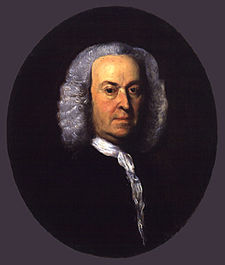Andrew Oliver
| Andrew Oliver | |
|---|---|

Portrait c. 1758 by John Singleton Copley
|
|
| Lieutenant Governor of the Province of Massachusetts Bay | |
|
In office March 14, 1771 – March 3, 1774 |
|
| Preceded by | Thomas Hutchinson |
| Succeeded by | Thomas Oliver |
| Personal details | |
| Born | March 28, 1706 Boston, Massachusetts |
| Died | March 3, 1774 (aged 67) Boston |
| Spouse(s) | Mary Fitch Mary Sanford |
| Profession | Merchant and politician |
Andrew Oliver (March 28, 1706 – March 3, 1774) was a merchant and public official in the Province of Massachusetts Bay. Born into a wealthy and politically powerful merchant family, he is best known as the Massachusetts official responsible for implementing the provisions of the Stamp Act, for which he was hanged in effigy. He never actually carried out those duties, and was later commissioned as the province's lieutenant governor.
Andrew Oliver was born in Boston, capital of the British Province of Massachusetts Bay, on March 28, 1706. His father, Daniel Oliver, was a wealthy and politically active merchant, and his mother, Elizabeth Belcher Oliver, was the daughter of Jonathan Belcher, son of another wealthy merchant and governor of the province in the 1730s. Andrew had two brothers: Daniel Oliver (1704–1727) and Peter Oliver (1713–1791). Characterized as "sober and pious", Andrew was sent to Harvard College, where he graduated in 1724.
Oliver then entered the family business, setting up a merchant business with his brother Peter that concentrated on wine and textiles. The business was successful, and the brothers eventually controlled Boston's Long Wharf. On March 20, 1728, Oliver married Mary Fitch, the daughter of Colonel Thomas Fitch. The couple had three children before Mary died in 1732; only one, a son named Andrew, survived to adulthood. After Mary's death Oliver traveled to England, returning to Massachusetts in 1734. On December 19, 1734 he married Mary Sanford of Newport, Rhode Island, the sister-in-law of Thomas Hutchinson. The couple had fourteen children.
In 1737 Oliver entered politics, winning election as Boston's town auditor. He held many other local offices, and became a leader of the Hutchinson-Oliver faction, which dominated politics in colonial Massachusetts. He was elected to the provincial assembly in 1742, and in 1755 was appointed provincial secretary by Acting Governor Spencer Phips.
...
Wikipedia
